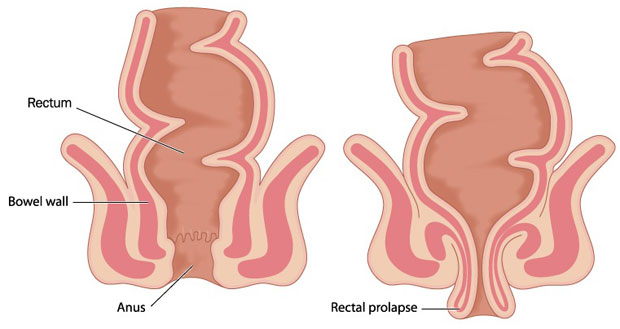Conditions – Anus
Rectal prolapse
Rectal prolapse occurs when the lower part of the bowel (rectum) pushes through the back passage into the outside. This occurs due to weakness of the sheet of muscles (pelvic floor) holding the rectum and due to redundancy of the rectum with poor fixation to the surrounding structures. Rectal prolapse is more common in women due to damage to the pelvic floor during childbirth which becomes weaker with increasing age due to loss of muscle bulk. It is also associated with prolonged constipation and straining.

Symptoms
The symptoms of rectal prolapse include pain, bleeding, constipation or loss of bowel control as well as a protruding mass through the back passage. Sometimes the prolapse can occur inside the rectum itself (intussusception) giving symptoms of difficulty opening the bowels and bowel blockage (obstructive defecation) with frequent and prolonged toilet visits. Frequently there is a need to apply pressure to the perineum, vagina or rectum using a finger or hand in order to help evacuate the bowel.
Diagnosis
Your history will be taken carefully and you will be examined in the area to establish the diagnosis and exclude other conditions. A proctoscopy or rigid sigmoidoscopy may need to be performed. Depending on the findings and your symptoms, your doctor may need to request a flexible sigmoidoscopy or colonoscopy to rule out any other condition further up the bowel which may be contributing to your symptoms or may request some imaging investigations in the form of a special x-ray called defecating proctogram, a MRI, CT scan or anorectal physiology studies.
Treatment options
The treatment options will depend on your general health whether you still want to have a family, as well as your symptoms and the degree of rectal prolapse. The surgical options include operations performed from inside the belly such as laparoscopic (keyhole) ventral mesh rectopexy and laparoscopic suture rectopexy and operations performed from the back passage such as Altemeier’s (perineal rectosigmoidectomy) and Delorme’s procedure. The most appropriate treatment option will be discussed with you at an individualised basis.
Choose Category
– Haemorrhoids
– Anal fissure
– Anal fistula
– Anorectal abscess
– Rectal prolapse
– Faecal incontinence
– Anal pruritus
Need to contact us or book an appointment?
Disclaimer
The information relating to general and colorectal disorders and their treatments given on this website is not complete and is not intended as a substitute for a consultation with your doctor. Always seek medical advice from your doctor before making a decision about any of the conditions and/or treatments mentioned on this website.
© Dr Georgios Markides
Contact Information
You can always contact our Clinic for booking appointments and other useful information:
Dr. Georgios Markides,
Consultant General & Colorectal Surgeon
Aretaeio Hospital, 55-57 Andreas Avraamides Str., 2024 Strovolos, Nicosia, Cyprus
+357-22-020728
Hospital: +357-22-200300
Fax: +357-22-512372
How to find us

